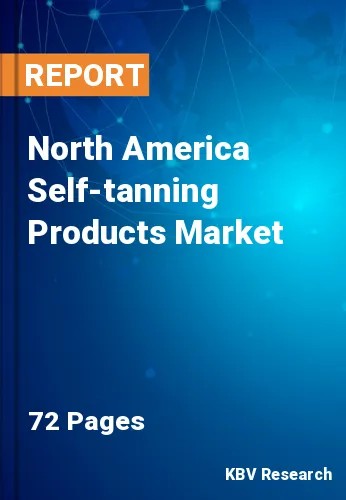The North America Self-tanning Products Market would witness market growth of 4.2% CAGR during the forecast period (2021-2027).
In the coming years, the premiumization of self-tanning items in terms of efficacy and environmentally friendly nature is expected to be a major factor attributed to the rise in the utilization of self-tanning products. Sustainability and environmental consciousness are also estimated to have a significant impact on the materials and active compounds used in the production of both the product and the packaging. Moreover, the premium self-tanning goods market would likely be driven by the market players' capacity to efficiently meet the requirements of its eco-friendly customers.
Self-objectification, which is defined as body surveillance, is the internalization of appearance based on a third-person perspective. It manifests as body surveillance or the regular monitoring of how one's body appears to others when it is heightened. Body surveillance, according to objectification theory, leads to a perceived failure to fulfill ideal body standards. Existing research suggests that body monitoring has a role in the development of women's body image problems. Body surveillance is a tactic used by women to determine how others will perceive and treat them. As a result, one of the postulated pathways in the development of body image dissatisfaction is body surveillance. Due to the rising concerns in people about body appearance, the demand for self-tanning products is estimated to increase in the forecasting years.
The cosmetics sector in Canada is rapidly growing for a very long period. Cosmetic development has a long history in Toronto. MAC is a Toronto-based cosmetics company. It is now a subsidiary of Estee Lauder, which has a prominent Markham facility. In Canada, there are a number of professional industry associations dedicated to cosmetics.
According to the Food and Drugs Act, cosmetics are defined as any product or a mixture of substances manufactured, distributed, and utilized for usage in cleansing, enhancing, or modifying the complexion, skin, hair, or teeth, including deodorants and perfumes. Cosmetics utilized by professional aesthetic services and bulk institutional items like soaps in school restrooms, and handmade cosmetics marketed through home-based companies or craft shops are all examples of this. Moreover, according to the Cosmetic Regulations and the Food and Drugs Act, cosmetics distributed in Canada must be created, prepared, preserved, packed, and stored in sanitary conditions.
The US market dominated the North America Self-tanning Products Market by Country 2020, and would continue to be a dominant market till 2027; thereby, achieving a market value of $222.3 million by 2027. The Canada market is anticipated to grow at a CAGR of 6.6% during (2021 - 2027). Additionally, The Mexico market would showcase a CAGR of 5.6% during (2021 - 2027).
Based on End User, the market is segmented into Women and Men. Based on Type, the market is segmented into Lotions, Gels and Others. Based on Distribution Channel, the market is segmented into Supermarkets & Hypermarkets, Convenience Stores and Online. Based on countries, the market is segmented into U.S., Mexico, Canada, and Rest of North America.
Free Valuable Insights: The Global Self-tanning Products Market is Estimated to reach $1.1 Billion by 2027, at a CAGR of 4.4%
The market research report covers the analysis of key stake holders of the market. Key companies profiled in the report include Avon Products, Inc., Shiseido Company, Limited, Clarins Group SA, L'Oreal Group, Estee Lauder Companies, Inc., Johnson & Johnson, Unilever PLC, Kao Corporation, Beiersdorf AG, and PZ Cussons plc.
By End User
By Type
By Distribution Channel
By Country
Our team of dedicated experts can provide you with attractive expansion opportunities for your business.

